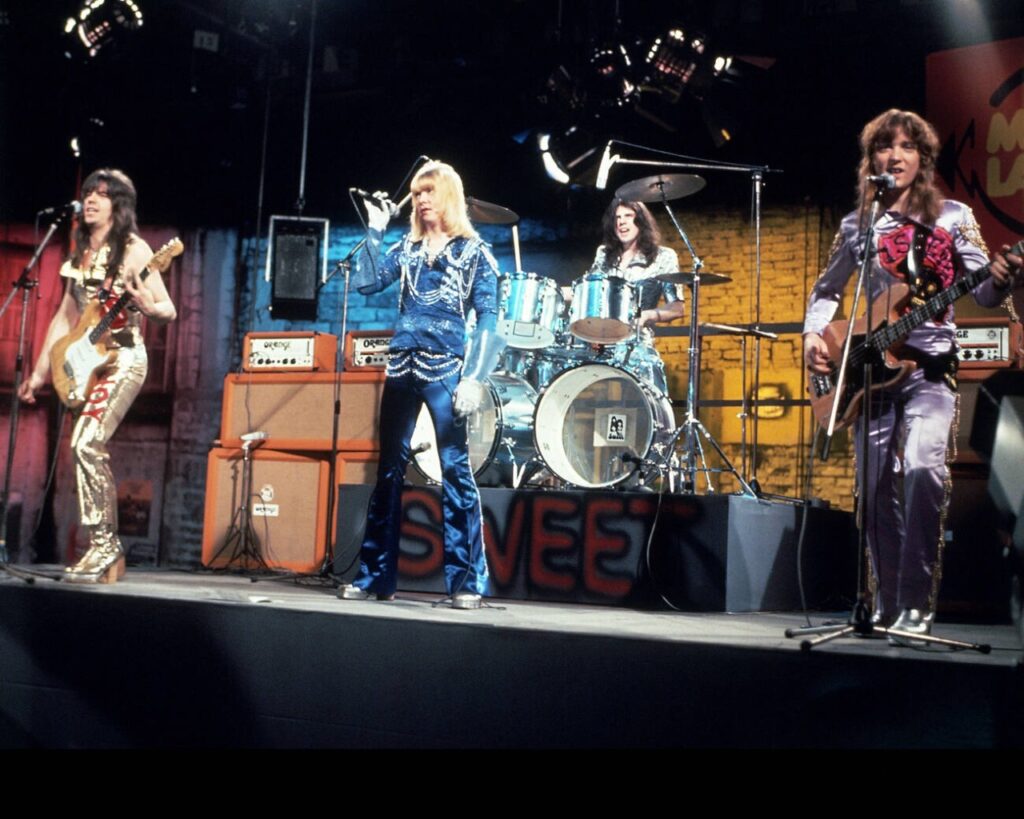
When the Glitter Fades: The Sweet’s Somber Ode to the Price of Stardom and Hollywood’s Hollow Promise
The mid-1970s. For those of us who lived through the vibrant, electric chaos of the Glam Rock era, the name Sweet (or sometimes The Sweet) conjures up a kaleidoscopic flash of platform boots, satin flares, soaring harmonies, and hard-rocking anthems. They were the architects of teenage hysteria, dominating the European charts with bubblegum classics like “Funny Funny” and “Co-Co” before transitioning into the heavier, more credible Rock gods responsible for “Block Buster!” and the eternal “The Ballroom Blitz.” Yet, as the decade wore on and the glitter began to flake, a deep, resonant change took hold of the band’s music. This shift found its most profound and melancholic voice in the 1976 single, “Lost Angels.”
Released in the twilight of their Glam heyday, “Lost Angels” did not replicate the chart-busting success of its predecessors—a fact that, ironically, makes it all the more significant as a critical and artistic statement. The single’s performance was a quiet echo compared to their earlier triumphs, though it still managed to make a respectable impression in parts of Europe. Most notably, it peaked at Number 5 in Sweden, and also achieved a Peak of 13 in West Germany and 11 in Austria. Crucially, it was the first Sweet single since 1971 that failed to chart in their native UK, a silent, painful signal that the pop landscape was changing and their glamorous reign was drawing to a close. Despite the modest chart showing, the song’s depth secured its place as a beloved, essential track from their 1977 album, Off The Record.
This was no accident of songwriting. The track was a full band effort, credited to the classic line-up—Brian Connolly, Andy Scott, Steve Priest, and Mick Tucker—and it spoke directly to the bittersweet experiences of a band caught between their bubblegum past and their hard rock ambitions, all while grappling with the often-brutal realities of superstardom. The story behind “Lost Angels” is essentially the story of Sweet’s disillusionment with the American dream, particularly the alluring yet unforgiving sprawl of Los Angeles.
By the mid-seventies, Sweet had made significant inroads into the US market, spurred on by the success of “Fox on the Run” and “Action.” But the move from being European monarchs to American hopefuls came at a cost. The high-energy, excessive touring, the endless grind of promotion, and the superficiality of the entertainment industry began to wear down the band’s unity and spirit. “Lost Angels” captures this weariness perfectly. It’s a road-weary, slightly cynical rock piece that trades the joyous frenzy of “Ballroom Blitz” for a moody, almost cinematic atmosphere.
The meaning of the song is etched into its very title. It’s a haunting meditation on the “lost souls”—the stars, the wannabes, the industry people—who come to Los Angeles, the City of Angels, seeking fame, only to find themselves swallowed whole by the machine. The lyrics paint vivid, lonely portraits of people adrift: “See them coming in the night / Lookin’ for the bright, white light,” and later, the mournful recognition, “They don’t know that they’re lost and alone / Living in a world that’s not their home.” It speaks of the emotional and moral cost of that relentless pursuit of fame, the chilling realization that the glittering city is ultimately a cold, empty place where dreams are manufactured and then quickly discarded. It is a profound departure from their earlier work, showcasing the genuine musical talent and lyrical maturity that the band had always fought to have recognized beneath the layers of makeup and outrageous costumes.
For those of us who remember buying the vinyl, the song remains a powerful and reflective counterpoint to the wild, reckless abandon of the Glam Rock movement. It’s the morning after the biggest party of your life, when the house lights come up, and you see the true, slightly broken faces in the crowd. “Lost Angels” is Sweet’s elegy for the innocence they lost on the road to becoming Rock royalty, a melancholic anthem for anyone who has chased a dazzling illusion only to confront the emptiness at its core. It reminds us that sometimes, the most honest music comes not from celebration, but from a quiet, painful understanding of the price of the ticket.